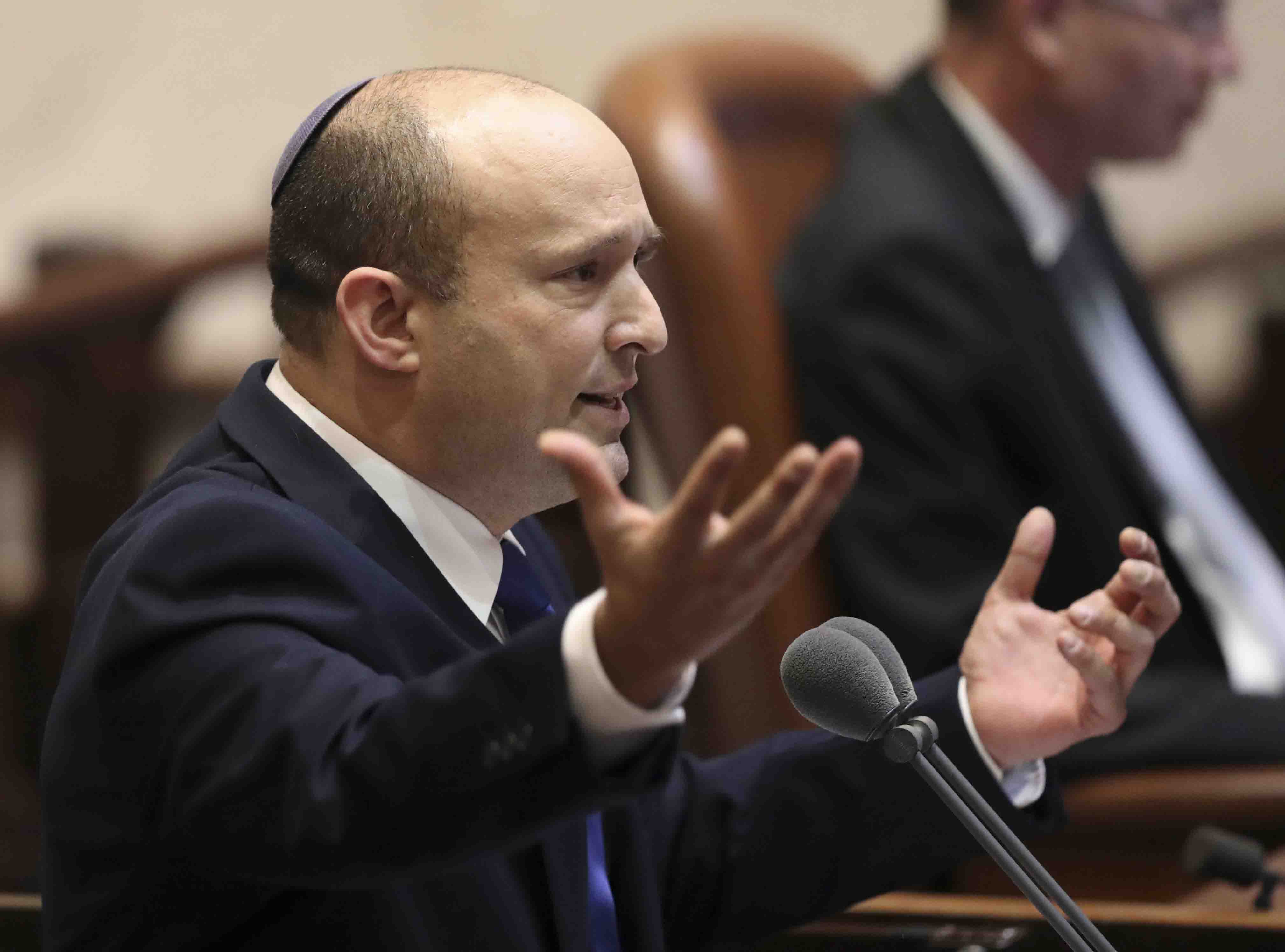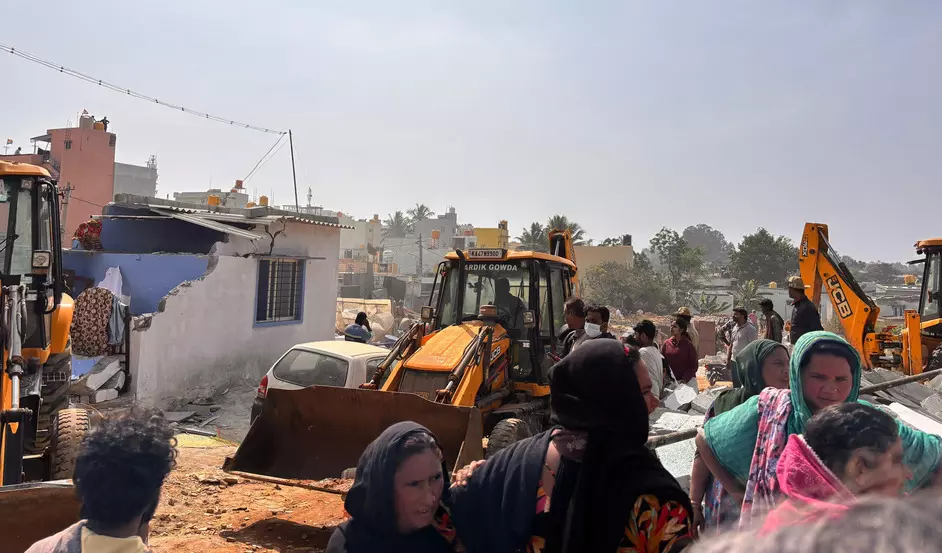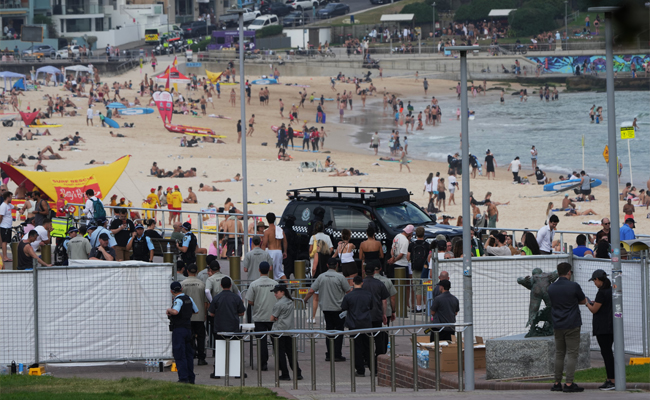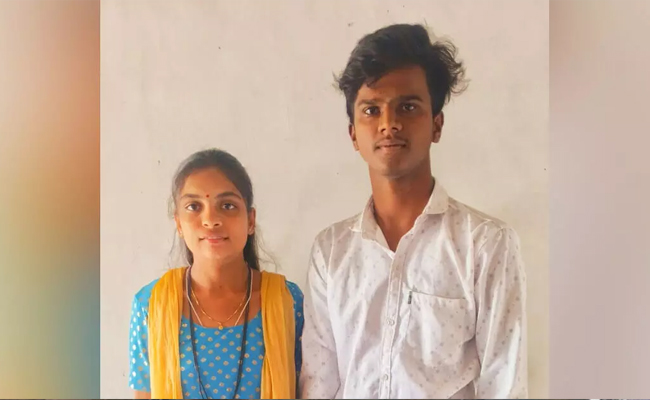Jerusalem, Jun 13: Naftali Bennett was on Sunday sworn in as Israel's new Prime Minister, ousting Prime Minister Benjamin Netanyahu from power after an uninterrupted 12 years at the helm of affairs.
Bennett, the 49-year-old leader of the right-wing Yamina party, took oath of office after the Knesset (Parliament) elected him as the 13th Prime Minister of Israel by a 60-59 vote in the 120-member house. One lawmaker abstained.
His government has 27 ministers, nine of them women.
The new government - an unprecedented coalition of ideologically divergent political parties drawn from the Right, the Left and the Centre, along with an Arab party - has a razor-thin majority in a 120-member house.
Mickey Levy of Yesh Atid party was elected as the speaker of Parliament with the support of 67 lawmakers.
Earlier, Bennett presented his new government's ministers in the Knesset (Israeli parliament) in a speech constantly interrupted by supporters of 71-year-old Netanyahu.
Amid incessant heckling from rival bloc's lawmakers, Bennett said that he is proud "of the ability to sit with people of different opinions".
"At the decisive moment we took responsibility," he said. "The alternative to this government was more elections, more hate, which would have broken up the country."
"It is time for responsible leaders from different parts of the nation to stop this madness, he asserted.
Agitated Likud, ultra-orthodox and ultra-nationalist lawmakers constantly jeered at Bennett during his speech calling him "a criminal" and a "liar".
In his speech, Bennett also said that Israel "will not allow Iran to arm itself with nuclear weapons."
"Israel will not be a party to the agreement and will continue to preserve full freedom of action, he said, opposing the US efforts to revive Iran's nuclear deal.
Bennett, a former ally turned rival of Netanyahu, is leading a fragile coalition of eight parties - Yamina, Yair Lapid's Yesh Atid, New Hope, Labor, Meretz, United Arab List, Kahol Lavan and Yisrael Beiteinu.
The alliance contains parties that have vast ideological differences, and perhaps most significantly includes the first independent Arab party to be part of a potential ruling coalition, Ra'am.
Bennett has entered into a power-sharing agreement with Centrist leader Yair Lapid, the head of the Yesh Atid party, under which the latter would take over Premiership in September 2023, serving for two years till the end of the term.
Lapid, the leader of the second-largest faction in the Knesset with 17 seats was invited by President Reuven Rivlin to form a coalition after Netanyahu, leading the Likud party with 30 seats, expressed his inability to put together a government backed by a majority of the lawmakers.
The unstable coalition that Lapid has managed to put together faces severe challenges and the glue that seems to hold them together is the 'unity of purpose' created by the agenda of ousting Netanyahu.
The approval of the new government by the Knesset ended 12 years of uninterrupted rule by Netanyahu, who holds the record of being the longest-serving Prime Minister in the country's history.
Having served in the position earlier between 1996 and 1999, Netanyahu last year surpassed the record held by one of the Jewish state's founding leaders, David Ben-Gurion.
In his address to parliament, Netanyahu vowed to bring down this "dangerous government".
"If it is destined for us to be in the opposition, we will do it with our backs straight until we topple this dangerous government and return to lead the country in our way, Netanyahu said as he made clear he has no plans on giving up leadership of the Likud Party.
Iran is "celebrating" the formation of a "weak government in Israel, Netanyahu said.
"From the moment the US returns to the nuclear deal with Iran, the incoming government won't approve significant operations in Iran," he said.
"A government that is not able to forcefully oppose the international community on the pressing issues for our fate is not worthy of leading Israel," he said, claiming that Bennett doesn't have the credibility or the global standing to stop Iran from acquiring nuclear capability.
The formation of the new government ended the political impasse in the country that saw four elections in less than two years leading to inconclusive results.
But opinion polls suggest that majority of the Israelis do not look too hopeful regarding the longevity of the coalition of eight parties who do not see eye-to-eye on most of the critical issues facing the country.
Many analysts feel that the two factors likely to prolong or determine the tenure of the new fragile coalition are the fear of Netanyahu's return and also a possible political demise of some of the right-wing factions that have gone against the wishes of their voting constituency to join hands.
It also includes Bennett's Yamina party which has to score some "major wins" to restore the faith of its supporters in the movement.
Interestingly, almost one-third of the people standing in unity to oust Netanyahu would otherwise be his 'natural allies' ideologically, having also worked as his close associates in the past.
Many analysts believe that Netanyahu's long-term 'invincibility' led to arrogance because of which he went on pushing his friends away from him each time there were differences of opinion, simultaneously also labelling them as Leftists as if it was a stigma.
It is still not all over for Netanyahu, who has dominated Israel's political landscape for years and would remain the head of the right-wing Likud party and become the leader of the opposition.
The coalition agreement involving eight factions with the 61 seats required for a majority was signed on June 2, just about half an hour before a deadline was due to expire.
Netanyahu is fighting corruption cases on fraud, bribery and breach of trust charges, which he denies. If he were to go into the opposition, he might be denied parliamentary immunity.
Let the Truth be known. If you read VB and like VB, please be a VB Supporter and Help us deliver the Truth to one and all.
Bengaluru: In an incident reported from the state capital, more than 3,000 people living in Fakir Colony of the Kogilu Layout near Yelahanka were rendered homeless by the officials of the Greater Bengaluru Authority (GBA) on Saturday.
The officials, who said the 400 houses were constructed on encroached land, held the operation using nine tractors and nine earthmovers, razing down the houses.
They have ousted around 90 per cent of the families who had been living in the area for more than 30 years and belong to minority communities, including Muslims from the colony.
The bereaved residents have insisted that the government had provided them land in the locality to build houses and reside. “We have all official documents as well as Aadhaar cards and voter IDs as proofs. Our source of livelihood is only manual labour,” they added.
“Many of the families had mortgaged the houses to get loans from banks, but the GBA officials have razed our houses without giving any prior notice,” they said and added, “Some of the women here are pregnant, but the officers showed no concern for such people too.”
Referring to the title deeds, the residents said that the local representatives had assured them that they would be handed the documents. “So far, however, we were not told to vacate the houses. Since the houses were unexpectedly razed, our children’s documents and other valuables in the houses have been destroyed,” the residents added angrily.
They also expressed fury about representatives failing to come to their help in times of need. “They come here only to campaign and get our votes. When questioned about the propriety of destroying the houses, the police officers assaulted us,” some of them said.
Sara Saif Saufique, one of the residents in the Fakir Colony, said, “My family has been living here for three decades, but has unexpectedly lost the house since the officers did not give us notice. They came at around 4:30 am on Saturday, when we were sleeping, and started destroying the houses.”
She said with fury, further, “The officials also forcibly evicted us from the houses, without even permitting us to gather our winterwear or blankets.”





